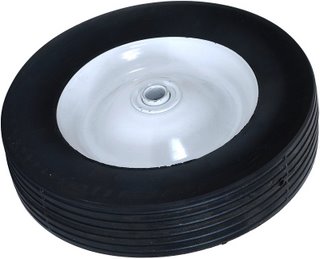 Look: this wheel has come off. For every one of us creative and marketing people who’ve rassled with client lawyers over the wording of brochure sentences, or what can’t be shown in an ad, there’s a lesson here.
Look: this wheel has come off. For every one of us creative and marketing people who’ve rassled with client lawyers over the wording of brochure sentences, or what can’t be shown in an ad, there’s a lesson here.It’s a cheerless one. In the “The M-BlawG” section of the April 15 number of the AMA’s Marketing News, I noted that Reebok, the athletic shoe manufacturer, is recalling 300,000 lead-based charm bracelets after a four-year-old swallowed the charm. And died of complications from lead poisoning. You can read the whole story here.
Here’s where a knowledgeable, experienced lawyer comes in – not after a tragedy like this happens, but before it happens. According to the story in Marketing News:
Health officials indicated that the bracelet was 99% lead; a second bracelet was 68% lead. The safety limit in jewelry in the United States is 0.006%. The promotional item, which Reebok says was made in China, was engraved with the Canton, Mass.-based company’s logo and was given as a free gift with the purchase of children’s shoes since May 2004.
This isn’t a problem of copyright law – it’s a consumer safety issue. And someone at Reebok, somewhere, never thought to ask about the lead content of the charm bracelet. The US government identified the toxicity of lead more than 30 years ago. The US voluntary toy safety standard, ASTM F-963-03, limits soluble lead in toys (that is, lead that may migrate from the toy and be ingested by a child) to no more than 90 parts-per-million (ppm). But under federal law, the US Consumer Product Safety Commission (CPSC) enforces a limit for total lead content of 600 ppm – that’s the 0.006% number in the quote above.
That’s why we need to think of all the ramifications of our activities (I wonder if I would have thought of it?) …and why we need our clients’ lawyers. In my own experience, the very best client lawyers – and I have worked with lots of them –do three things:
- Refrain from imposing their subjective opinions on your creative expressions
- Advise you of the relative risks involved in specific cases, like product comparisons – and let you make the decisions
- Inform you when you absolutely cannot say, picture, or do something that is, de jure, illegal.
In the Reebok case, the promotional item was illegal. Its composition was against the law in May 2004; it’s against the law now. True: hindsight is 20/20. Also true: a conscientious lawyer keeps you from making a deadly error before you make it. Before the wheels come off your promotion or your marketing activity.
I am sorry for the child that died from swallowing the charm, and sorry for his parents. Sorry for Reebok, whom I’m certain meant no harm. But this is one of those cases where I’m really sorry that an attorney familiar with CPSC law didn’t blow the whistle. That’s “why lawyers.”
No comments:
Post a Comment